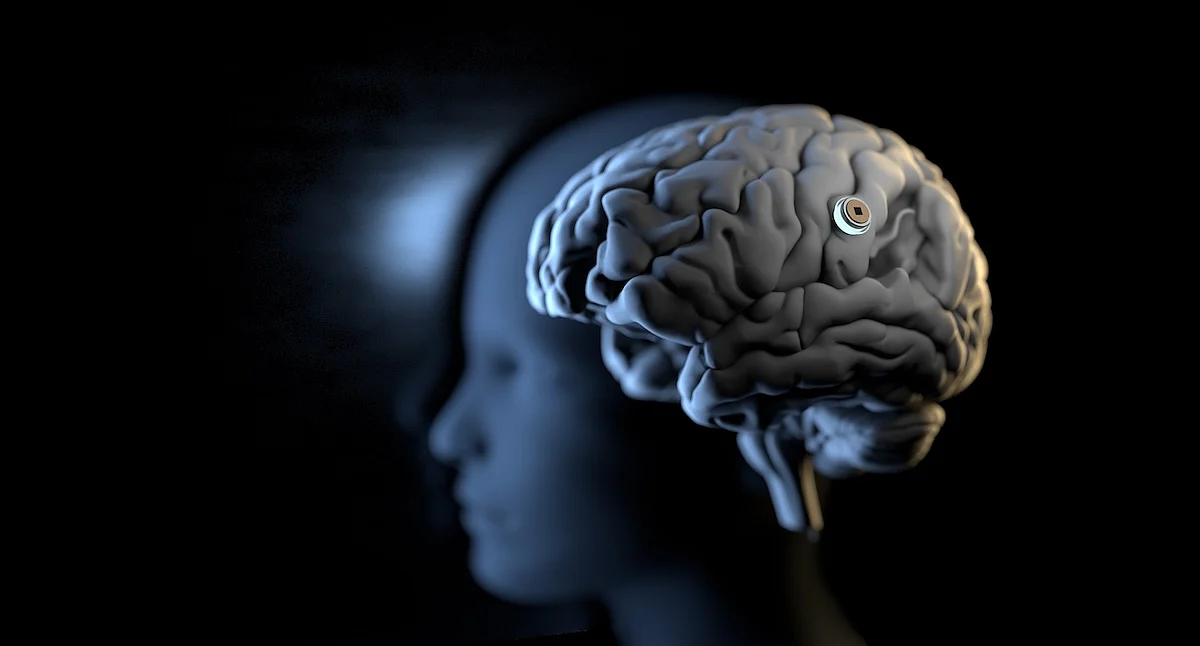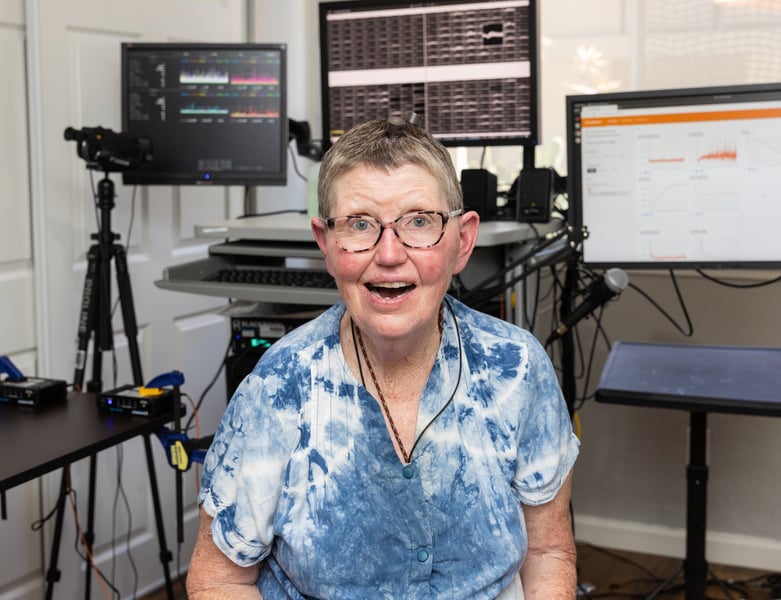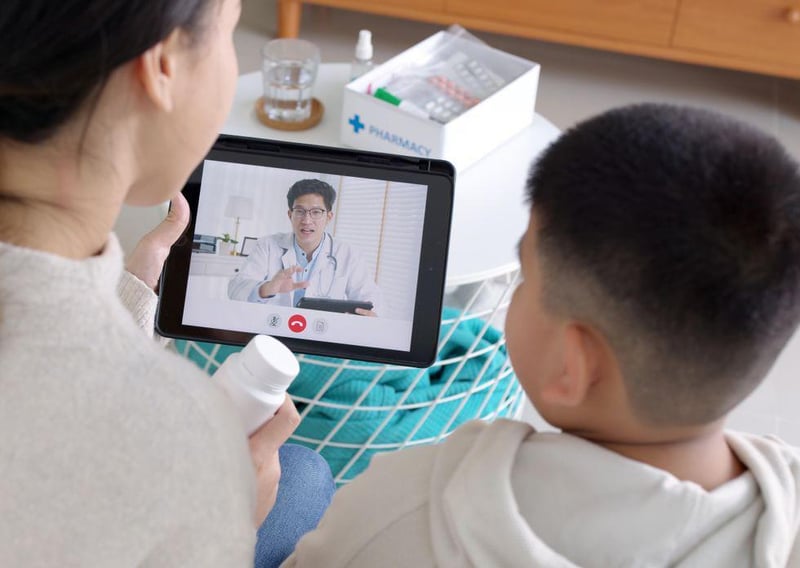Patient Resources
Get Healthy!
Results for search "Speech Disorders".
Health News Results - 16
New Brain Implant Could Let People Speak Just by Thinking Words
- I. Edwards HealthDay Reporter
- August 15, 2025
- Full Page
FRIDAY, Aug. 15, 2025 (HealthDay News) — For the first time, scientists have created a brain implant that can “hear” and vocalize words a person is only imagining in their head.
The device, developed at Stanford Unive...
Magnetic Stimulation Aids Speech Recovery Following Stroke
- HealthDay Reporter
- Dennis Thompson
- April 18, 2025
- Full Page
Lucy Mulloor woke one morning to find she couldn’t call out to her two daughters, who were bustling about the kitchen.
She also couldn’t move the right side of her body, and only attracted her girls’ attention by falling to the floor after working her w...
Not Just Blabber: What Baby's First Vocalizations and Coos Can Tell Us
- HealthDay Reporter
- Dennis Thompson
- December 20, 2024
- Full Page
A baby’s gentle murmurs and coos can melt even the stoniest heart.
But those giggles and babbles are more than just music to a doting parent’s ears.
These vocalizations actually are signs that a baby’s heart is working rhythmically in concert with...
Reading to Your 1- and 2-Year Old Boosts Their Vocabulary, Study Finds
- HealthDay Reporter
- Carole Tanzer Miller
- October 3, 2024
- Full Page
Sharing a book with your baby will build her vocabulary fast, but time with screens likely won't, Norwegian researchers report.
Their new study on shared reading and vocabulary size dovetails with a new policy statement from the
AI Implant Allows Stroke Survivor to Communicate in Both Spanish, English
- HealthDay Reporter
- Robin Foster
- May 29, 2024
- Full Page
A bilingual brain implant has allowed a stroke survivor to communicate in both Spanish and English, scientists report.
Turning to an AI method known as a neural network, researchers trained the patient's implant to decode words based on the brain activity produced when...
Scientists Spot Brain Cells That Prepare You to Speak
- HealthDay Reporter
- Dennis Thompson
- February 2, 2024
- Full Page
Advanced brain recording techniques have revealed how neurons in the human brain work together to produce speech.
The recordings provide a detailed map of how people think about what words they want to say and then speak them aloud, researchers report in the Jan. 31 issu...
ALS Robbed Her of Speech, But Technology Is Changing That
- HealthDay Reporter
- Dennis Thompson
- August 23, 2023
- Full Page
Many people with Lou Gehrig's disease, also called amyotrophic lateral sclerosis (ALS), first start to lose the ability to move their arms and legs.
That's not Pat Bennett. She can move just fine. She can still dress herself, and she can even use her fingers to type.
...Kids With Nonverbal Autism May Still Understand Much Spoken Language
- HealthDay Reporter
- Dennis Thompson
- May 4, 2023
- Full Page
About a third of children with autism aren't able to speak -- but that doesn't mean they're unable to listen and comprehend, a new study reports.
About 1 in 4 kids and teens who have autism and are minimally verbal understand significantly more language than they're able...
AI Might Spot Alzheimer's Early, Using Folks' Speech Patterns
- HealthDay Reporter
- Cara Murez
- April 14, 2023
- Full Page
Cutting-edge AI technologies that can detect subtle changes in a person's voice may help doctors diagnose Alzheimer's disease and other cognitive impairments even before other symptoms begin.
Singing Might Aid Recovery After a Stroke
- HealthDay Reporter
- Cara Murez
- January 3, 2023
- Full Page
Singing may help stroke patients regain communication skills, according to new research.
About 40% of stroke survivors have aphasia, a difficulty to deliver or comprehend spoken or written language. That impairment is ongoing for about half of those patients a year after...
Babies' Babble Brings Big Learning Bonus
- HealthDay Reporter
- Ellie Quinlan Houghtaling
- July 11, 2022
- Full Page
Babies' babble may be smarter than you think.
A new study shows that infants as young as 3- to 5-months of age can tell that the unintelligible sounds they make before they learn to talk can impact the people around them.
Traditionally, this babbling has been regar...
Lockdowns May Not Have Harmed Toddlers' Language Learning: Studies
- HealthDay Reporter
- February 9, 2022
- Full Page
The pandemic has dramatically disrupted kids' normal routines, but a new study suggests the initial lockdowns of 2020 did not necessarily hinder preschoolers' language development.
In fact, researchers found, there was an unanticipated "lockdown boost" in youngsters' voc...
Parlez-vous 'Woof'? Dogs May Distinguish Between Different Human Languages
- HealthDay Reporter
- Cara Murez
- January 6, 2022
- Full Page
Dogs don't speak a human language, but they do know when you switch from one tongue to another, an intriguing new study finds.
"We know that people, even preverbal human infants, notice the difference," said study co-author Laura Cuaya of Eötvös Loránd Universit...
'Baby Talk' Could Help Spot Infants With Autism
- HealthDay Reporter
- Cara Murez
- January 5, 2022
- Full Page
That sing-song speech parents use when talking to their babies is universal, and infants tend to prefer it.
So, when a baby doesn't seem to engage with this melodic "motherese," or baby talk, it can be an early sign of
'Baby Talk' Is Really Helping Baby Learn
- HealthDay Reporter
- Robert Preidt
- December 13, 2021
- Full Page
You may feel silly doing it, but baby talk helps your infant learn the basics of human language, a new study suggests.
By mimicking the sound of a smaller vocal tract, baby talk<...
Telemedicine May Not Work for Speech, Voice Therapy
- HealthDay Reporter
- Robert Preidt
- August 9, 2021
- Full Page
Telemedicine may fall short when it comes to people with voice and speech disorders, researchers report.
There was a significant rise in telemedicine use -- health visits using computer, tablet or smartphone video conferencing -- during the COVID-19 pandemic. And even th...
















